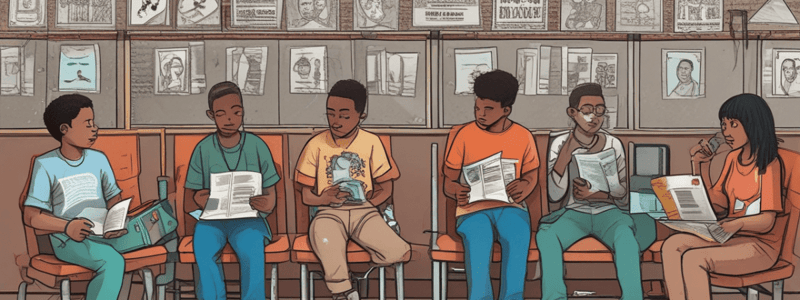Podcast
Questions and Answers
What are some protective factors that can help individuals thrive despite difficulties?
What are some protective factors that can help individuals thrive despite difficulties?
- Punitive policies, high income, and academic achievement
- Positive parent-child relationship, strong self-efficacy, and social support (correct)
- Negative peer influence, low self-esteem, and lack of resources
- Adverse childhood experiences, trauma, and maltreatment
What is the definition of resiliency?
What is the definition of resiliency?
- The ability to give up when faced with difficulties
- The ability to ignore difficulties and pretend they don't exist
- The ability to thrive or adapt despite difficulties (correct)
- The ability to avoid difficulties altogether
Which group of students is disproportionately impacted by punitive policies in schools and juvenile justice systems?
Which group of students is disproportionately impacted by punitive policies in schools and juvenile justice systems?
- High-achieving students
- Students with supportive families
- Impoverished, minority, and special education students (correct)
- Students with no history of behavioral issues
What is the potential impact of maltreatment and trauma on students?
What is the potential impact of maltreatment and trauma on students?
Which group of students is at greater risk for exclusionary discipline, juvenile court involvement, and homelessness?
Which group of students is at greater risk for exclusionary discipline, juvenile court involvement, and homelessness?
What are some factors that contribute to the disproportionate impact of punitive policies on certain groups?
What are some factors that contribute to the disproportionate impact of punitive policies on certain groups?
What is a potential effect of implicit and explicit bias and stereotyping?
What is a potential effect of implicit and explicit bias and stereotyping?
What may explain disparities in discipline and court involvement?
What may explain disparities in discipline and court involvement?
What may help prevent unnecessary arrests or school exclusion?
What may help prevent unnecessary arrests or school exclusion?
What is a potential contributor to the issue of disproportionate impact of punitive policies?
What is a potential contributor to the issue of disproportionate impact of punitive policies?
Study Notes
- Protective factors include positive parent-child relationship, strong self-efficacy, and social support.
- Resiliency can be seen as the ability to thrive or adapt despite difficulties.
- Impoverished, minority, and special education students are disproportionately impacted by punitive policies in schools and juvenile justice systems.
- Maltreatment and trauma victims are at higher risk for special education disabilities and school discipline.
- LGBT students are at greater risk for exclusionary discipline, juvenile court involvement, and homelessness.
- Inherent bias and targeting, comorbid difficulties, and segregation by race and class contribute to disproportionate impact.
- Implicit and explicit bias and stereotyping may affect perceptions of others.
- Unfair targeting may explain disparities in discipline and court involvement.
- Investigating mitigating history and circumstance may help prevent unnecessary arrests or school exclusion.
- Structural problems, such as school segregation by class and race, may contribute to the issue.
Studying That Suits You
Use AI to generate personalized quizzes and flashcards to suit your learning preferences.
Description
Test your knowledge on the factors contributing to disparities in discipline and court involvement among students, including protective factors, resiliency, implicit bias, and structural problems in the education system.




